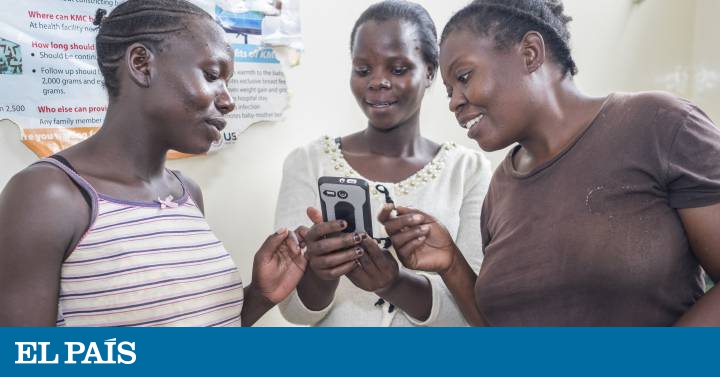MORE INFORMATION
- “Algerians fight even their tragedies with humor”
- 30 characters that don't conform
- Who cares for the mothers who most see their children die?
The birth of a child can become a real family drama and leave the mother's orphan baby due to complications in pregnancy, childbirth or postpartum. While the overall maternal mortality rate has experienced a decline in recent decades, it remains unacceptably high.
Inequities in access to health services continue to highlight the persistence of geographical or ethnic inequalities. As the latest UN report on the subject warns, about 99% of maternal deaths occur in low and middle-income countries, and in sub-Saharan Africa - home to 66% of global maternal deaths - they are almost 50 times more high than in any other region of the world. Given this scenario, what can technology do?
While the number of African startups has tripled, the growing sector of technology and digital innovations could be providing considerable support to all the small advances that are being made in the continent in this area, and provide their grain of sand so that the Motherhood is cause for happiness and not for tragedy.
The case of Kenya is paradigmatic. Despite having high death rates during pregnancy and childbirth - more than 300 annual deaths per 1,000 births - it is one of the countries where more progress is being made in reproductive health. Being the second innovative economy of the continent according to the latest World Innovation Index, the East African country is setting a new direction in terms of health innovation with public-private financing projects that are worth following closely.
One of the most interesting is the Safe Delivery mobile and tablet application. Developed by the Danish Foundation Maternity, the University of Copenhagen and the University of Southern Denmark with funds from the Bill & Melinda Gates Foundation, this tool designed and directed to healthcare professionals, provides video tutorials, explaining, step by step, different procedures of sexual, reproductive and maternal health.
In Kenya, where of the 25,000 active nurses only 2,000 have specific training, an app is proving to be crucial when it comes to training professionals
Successfully implemented in 40 low and middle income countries in Southeast Asia and sub-Saharan Africa, it has already proven its effectiveness in countries such as Sierra Leone: one of the most insecure places in the world when it comes to giving birth to a child according to the Fund of Population of the United Nations (UNFPA). There, the experience has left evidence of improvement in the skills of midwives and other health professionals, contributing to improve the skills, knowledge and confidence to operate both normal deliveries and obstetric complications.
In Kenya, where according to the National Association of Midwives, of the 25,000 active nurses only 2,000 have specific training as such, this same application is proving crucial when it comes to training midwives and professional nurses. And that is why several medical schools have already implemented Safe Delivery, too, as another resource in the classroom.
Another digital solution, iDeliver, is also working in nine facilities in the country, where it has been applied in more than 4,100 births. Launched in 2017, this innovative support tool for improving decision-making when serving parturients is revolutionizing the world of maternal health in the region. Funded by MSD for Mothers - an initiative that works to make pregnancy and childbirth safe and healthy experiences - and operating in different centers such as the Nairobi Women's Hospital, iDeliver carries out its work in order to reduce mortality rates of the mothers of the country.
“Here in Zanzibar, we are also using iDeliver at the Mnazi Mmoja Hospital. So far, our people have praised it as a superior tool compared to the past, ”explains Hamad, a Zanzibari nurse who has started using this tool.
Based on the guidelines and recommendations of the World Health Organization, the application serves as support to health workers from the patient's triage through diagnosis or referral in the intrapartum period, and is able to support medical performance even during postnatal care.
In this way, midwives and doctors who care for the mother with the support of iDeliver, can collect and store information in the patient's obstetric history with a simple computer. From this, the data is organized in such a way that the application can propose treatment options and medical actions depending on the circumstances. Thus, the medical team optimizes the reaction time, prioritizes tasks when attending to several mothers at the same time, detects emergency situations early and can follow appropriate protocols, as well as more easily monitor each patient avoiding fetal suffering or even the death of the baby.
“As patient data is added to iDeliver, the severity level of each patient is calculated in real time, which helps providers identify the most critical patients. In this way, guidance for caregivers helps reduce the time from registration to treatment and reduces the time between observations for more critical patients, ”says Paul Amendola, executive director of VecnaCares, the company that implements iDeliver in East Africa . "Both the governments and the administration of the various hospitals, such as the Mnazi Mmoja of Tanzania, are excited that the system replaces its current role-based operation," he emphasizes.
However, technology alone cannot be perceived as a panacea when it comes to improving quality standards in health care, especially in countries in a region such as sub-Saharan Africa.
Complement and not substitute
“New technologies, when implemented correctly, have the potential to significantly increase the quality of care, even with limited investment. As digital technology becomes general and available, there is the potential to take advantage of the available infrastructure to better manage and capture patient data, and convert the available data into actionable clinical responses. When better data is collected and managed, caregivers have better organized information and patients receive better care. In general, technology such as iDeliver can increase the effectiveness of a supplier with limited investment, ”says Paul Amendola.
The lack of resources dedicated to public health systems, sex education or the lack of trained personnel in hospitals and clinics in African countries are crucial issues. And yet, innovation and technology, mostly driven by private companies and the financing of philanthropic corporations, can help mitigate serious problems such as maternal mortality. "Our budget allocations to health are generally insignificant, so innovations such as these create a solid platform where medical care can be supported to provide good services to the last person in the community, regardless of deficiencies," says Hamad , which regularly uses this application to treat pregnancies and births in Zanzibar.
1 in 37 women in sub-Saharan Africa face a real risk of death
Ten years after the term established to achieve the Sustainable Development Goals, its goal number 3 "ensure healthy lives and promote well-being for all" - where the commitment is assumed to "reduce maternal deaths worldwide to less than 70 for every 100,000 live births ”, it is presented as a true chimera in countries such as Chad, Sierra Leone and South Sudan.
Whether due to the lack of investment in training or infrastructure or a weak public system unable to employ well-trained people, 1 in 37 women in sub-Saharan Africa today faces a real risk of death during pregnancy or childbirth. The training of doctors capable of performing caesarean sections, private financial support to hospitals, the training of midwives or enabling mothers to stop giving birth at home are crucial when it comes to rapidly improving the flagrant data that adds women Africans at the tail of global reproductive health. However, they are not the only solutions.
However, public health is ultimately a political choice that has the future of African mothers in their hands. As some UN experts such as Philip Alston have already denounced, the privatization initiated in the 1970s in regions such as sub-Saharan discriminates against the poorest and excludes them from the system. There are also investigations that show that, as a result of these privatizations, the highest levels of maternal mortality in Africa are found in nations that receive loans from the International Monetary Fund. Therefore, if the next 10 years must be the "decade of action", as the United Nations General Assembly has pointed out, they must also be so as to take the issue of health with the seriousness and responsibility it deserves . Only then, technological innovations such as Safe Delivery or iDeliver can catalyze to the maximum the mitigation of maternal mortality throughout the sub-Saharan region.
You can follow PLANETA FUTURO on Twitter and Facebook and Instagram, and subscribe here to our newsletter.




/cloudfront-eu-central-1.images.arcpublishing.com/prisa/NDOLPLTSMZFBFKHXOW3LXEFPOA.jpg)
/cloudfront-eu-central-1.images.arcpublishing.com/prisa/JQGTFHNDXJC7FMAWD6FP325PUU.jpg)







/cloudfront-eu-central-1.images.arcpublishing.com/prisa/KMEYMJKESBAZBE4MRBAM4TGHIQ.jpg)

